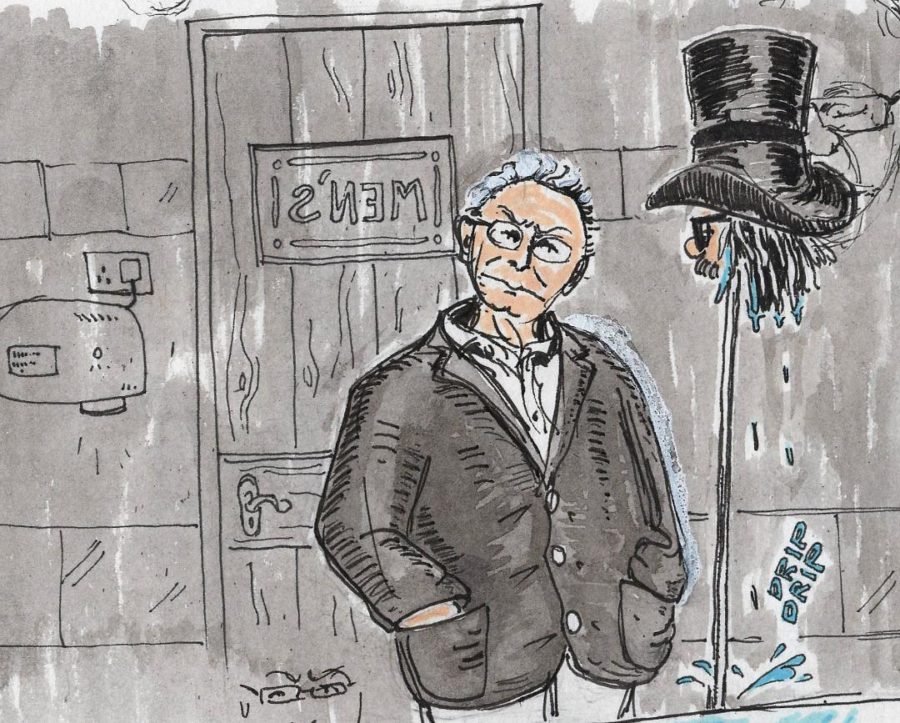It was flattering to read Fintan O’Toole respond, however oblique, to my criticism of his generally hysterical book on Brexit. In an Irish Times article on February 19th he claims the English eccentricity I praised has morphed into sinister idiosyncrasies, personified by what he impolitely refers to as the ‘swivel-eyed-loon’ Brexiteers. The association of physical disability with an opposing point of view is a low blow indeed in a bigoted article attempting to define apparently timeless national traits.
As a last throw of the dice O’Toole adduces evidence from George Orwell to the effect that the English have always been, in actual fact, rather a conformist lot, now queuing obediently for the train marked oblivion.[i]
O’Toole realises you cannot blacken the reputation of all things English, and seemingly as an afterthought, invokes the authority of the English secular saint. Never mind that Orwell actually credited his compatriots with an abiding belief in the Rule of Law and in holding power to account, a trait the once inquisitorial O’Toole seems to have forgotten.
It is fair to say that Orwell has never been unfashionable, but the spectre of his ideas is much evident in this zeitgeist. Beyond even his novels, Animal Farm (1945) and 1984 (1949), which define and anticipate the nature of totalitarian rule, Orwell was probably the greatest essayist of all time, foreseeing, like a clairvoyant, so many of the problems we now confront. He still stands for decency and humanism.
O’Toole, in a spurious impression of radicalism – reminiscent of an intellectual Father Brian Trendy – appeals to the baser instincts towards English-bashing in Ireland; essentially condemning the vainglorious Brexiters for cutting off and undermining our gravy train of inequitable farm subsidies.
Unlike O’Toole, Orwell respected the common sense of the common man, and never resorted to popular prejudice or vulgar nationalism.
In ‘The Lion and The Unicorn’ (1940) Orwell claimed that English people held a belief in justice, not a fear of power. He further argues, in ‘Inside The Whale’ (1940), that this stemmed from a lack of experience of government repression:
With all its injustices England is still the land of habeas corpus and the overwhelming majority of English people have no experience of violence and illegality.[ii]
In ‘Homage to Catalonia’ (1938) he shows how extremism imposed no restraints or boundaries, leading to a descent into lawless banditry. England today is still suffused with moderation, incrementalism, and the population are not generally exposed to licensed thuggery.
In my experience of living in the country, people commonly still do not understand and do not tolerate the manipulation or abuse of law by Power. In this respect they are increasingly alone in Europe, with Spain mounting show trials against Catalan ‘putschists’ for daring to hold an independence referendum, and fascist taking power in Hungary and Italy.
O’Toole could profitably read various pieces I have written on the Rule of Law and corruption of state agencies in Ireland.[iii] These are all available for free online – unlike the subscriber-based Irish Times. He should take note of the following points, which might cause indigestion in his pampered readership of retired, or retiring, civil servants.
- An Garda Siochana, the Irish police force, has been a criminally-led organisation.
- A politically-anointed judiciary have contributed to the undermining of the Rule of Law by supporting this police force, and have failed to build on existing Constitutional rights to alleviate the Housing Crisis.
- Government agencies have framed ‘enemies of the people’, who blow the lid on corruption (Orwell in ‘Such Were The Joys’ is remarkably insightful about the manipulation of children, whereas O’Toole, with a unique platform in the Irish media, does nothing to draw attention to ongoing injustices).
- Ireland is the perfect neo-liberal shit storm, where high economic growth is an illusion, as evictions continue apace, amid spiralling inequality.
Without succumbing to timeless stereotypes, I suggest the English still commonly believe, in the confused conversation around our global meltdown, that the underdog should be protected. As a barrister I have found that the obligation to vindicate the Rule of Law against the interests of the powerful, and holding elites to account, is taken seriously. Among the myriad motivations for the Brexit vote was a discomfort among ordinary people with the idea of being undermined by faceless bureaucrats in Brussels.
In contrast Fintan O’Toole’s Irish Times upholds the obligation of the common man to repay his debts to predatory international financial institutions.
In ‘The Lion and the Unicorn’ Orwell also notes how the English instinctively despise miscarriages of justice and hold power to account, believing in the impartial administration of the law by independent magistrates. In contrast, I find little attention being paid to the daily injustices occurring in Ireland in Fintan O’Toole’s current output.
Orwell is also very attuned to misuse of language. A prevalent theme is how expression should be clear and unequivocal, and in a plain style that emphasising informality and flexibility. He would have no truck with the cheap rhetorical devices O’Toole trades in.
In ‘The Prevention of Literature’ (1946) Orwell intimates that the enemies of truth and freedom of thought are press lords and bureaucrats. In Ireland today a preening Irish Times sits atop the tree, reassuring all and sundry about what a wonderful creative country this is – and never mind you can’t find somewhere to live.
O’Toole’s sanctimonious brand of journalism works a treat, offering sufficient distraction to the little people to allow the ‘adults in the room’ to get on with plundering the larder.
We rely on contributions to keep Cassandra Voices going.
[i] Fintan O’Toole, ‘The English Love of the Eccentric has Turned Sour’, February 19th, 2019, Irish Times, https://www.irishtimes.com/opinion/fintan-o-toole-the-english-love-of-eccentricity-has-turned-sour-1.3797907, accessed 22/2/19.
[ii] http://orwell.ru/library/essays/whale/english/e_itw, accessed 22/2/19.
[iii] David Langwallner, ‘The Fragile Rule of Law in Ireland’, 18th of February, 2018, https://villagemagazine.ie/index.php/2018/02/unruly-2/, accessed 22/2/19.




